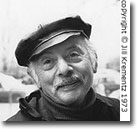Books |
Stanley Kunitz
By
Published: Jan 01, 2007
Category:
Poetry
It says a great deal about Stanley Kunitz that he was 95 when he was named Poet Laureate for the second time. First, it reminds us that he lived to a great age — he died, in 2006, at 100 — and was a vital talent right to the end. And, even more, it underscores that his career was more of a marathon than a sprint. W.H. Auden got it exactly: “It’s strange, but give him time. A hundred years or so. He’s a patient man. He won’t mind waiting.”
The really fascinating news, though, is that Stanley Kunitz continually improved as a poet. “Passing Through: The Later Poems” — almost universally considered the best of his ten books — was published when he was 95. And, for once, “best” and “most accessible” belong in the same sentence. For as he aged, Kunitz said, “I’ve learned to strip the water out of my poems.” The result is a clarity and directness that makes Kunitz an ideal poet both for people who only sort of like poetry and for those who like to dig into a poem and explore the layers.
Digging in: That’s the right phrase to describe the pleasure of a Kunitz poem. He was a lifelong gardener, and as soon as he arrived at his summer home on Cape Cod he was with his plants: tending, pruning, marveling. (His final book, published in 2007, is a gardening chronicle.)
This connection with growing things is closely connected to the key issue of Kunitz’s life and work — parenting. An odd connection? Consider the biography. A few weeks before he was born, his father drank carbolic acid and died. His mother, a tough-minded immigrant, raised two daughters and Stanley for eight years, then married a charming, loving man who was like a father to the boy. Alas, he had a fatal heart attack four years later.
Kunitz might have found “the lost father” at Harvard, but after graduating summa cum laude he was told there was no teaching opportunity there — the Christian students might resent a literature instructor who was a Jew. He gigged around, committed himself to poetry and began a seventy-five year career as a poet.
The poems in “Passing Through” touch all the bases. Right off, we get the primary wound (which Kunitz repeated by leaving his first wife and young daughter): “You say you had a father once/his name was absence.” He has a healthy interest in women: “I think I’d rather sleep forever/than wake up cold/in a country without women.” He’s got a loving father’s appreciation for his daughter: “I like the sound of your voice/even when you phone from school/asking for money.” And on the biggest topic of all:
Peace! Peace!
To be rocked by the Infinite!
As if it didn’t matter
which way was home;
as if he didn’t know
he loved the earth so much
he wanted to stay forever.
But lines out of context aren’t nearly as appealing as the thing itself. Here’s “Passing Through,” written to mark his 79th birthday:
Nobody in the widow’s household
ever celebrated anniversaries.
In the secrecy of my room
I would not admit I cared
that my friends were given parties.
Before I left town for school
my birthday went up in smoke
in a fire at City Hall that gutted
the Department of Vital Statistics.
If it weren’t for a census report
of a five-year-old White Male
sharing my mother’s address
at the Green Street tenement in Worcester
I’d have no documentary proof
that I exist. You are the first,
my dear, to bully me
into these festive occasions.
Sometimes, you say, I wear
an abstracted look that drives you
up the wall, as though it signified
distress or disaffection.
Don’t take it so to heart.
Maybe I enjoy not-being as much
as being who I am. Maybe
it’s time for me to practice
growing old. The way I look
at it, I’m passing through a phase:
gradually I’m changing to a word.
Whatever you choose to claim
of me is always yours:
nothing is truly mine
except my name. I only
borrowed this dust.
To buy “Passing Through” from Amazon.com, click here.
To buy “The Wild Braid: A Poet Reflects on a Century in the Garden” from Amazon.com, click here.
To buy “The Light Within the Light: Portraits of Donald Hall, Richard Wilbur, Maxine Kumin & Stanley Kunitz” from Amazon.com, click here.


